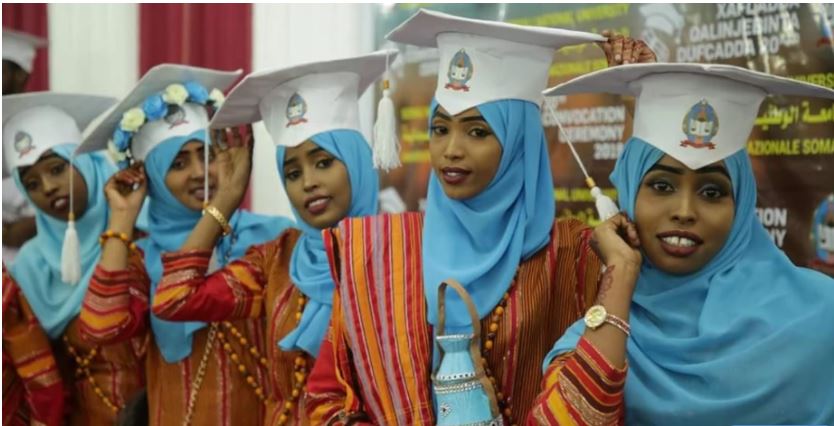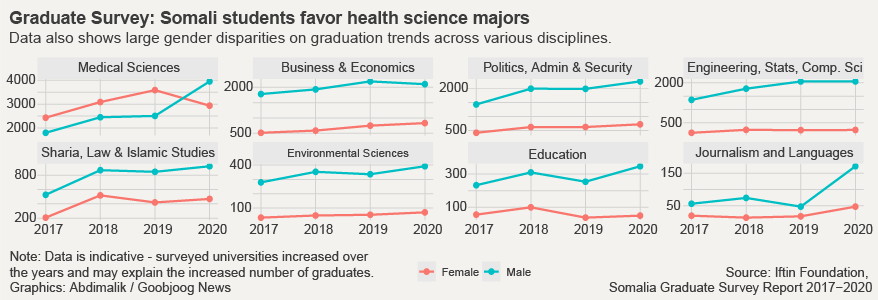Somalia Graduate Survey: Students shun teaching and vocational careers

By Mohamed Abdimalik
GOOBJOG NEWS|SOMALIA: Somali students are shunning teaching and vocational careers in favor of medical sciences, according to new data on 2020 college graduation published by Iftin Foundation, a nonprofit focused on access to education and career opportunities in Somalia.
The 2020 graduate survey collected data from 52 universities in 11 cities across five federal member states and Mogadishu. The data did not include universities in Somaliland and missed a few in Puntland. However, the organization’s program coordinator, Abdiweli Mohamed, says it provides “the best indicative picture of graduation trends” in Somalia.
By the numbers
Participating universities conferred a record total of 17,548 bachelor degrees in 2020, which is an increase of 10.2 percent compared to 2019 figures of 15,927. Out of these, 70% (or 12,196) were male, while 5,352 were female. A significant gender gap persists across all the fields of study except in the health sciences. In 2020, women accounted for only 10 percent of undergraduates degrees awarded in engineering, computer science, and statistics.
Nearly 40 percent (or 6,889) of the graduates were awarded degrees in nursing (2,270 students), medicine and surgery (845), public health (1,715), laboratory (1,493), and a host of other fields such as veterinary, pharmacy, and nutrition.

Engr. Bashir Awdini, the rector of Salaam University, says that “good employment expectations, peer and parental pressure” push the majority of the students to health-related fields.
Business degrees are the second top majors favored by Somali students. About 17 percent (or 2,936) earned degrees overwhelmingly in majors such as banking, accounting, and human resource management. Only about 10% of the business students majored in economics.
Despite the widespread shortage of trained teachers, education faculties produce the lowest number of graduates each year. Since 2017, surveyed universities have conferred less than 1,400 bachelors in education or around 350 potential teachers per year in the four years.
Lack of guidance on career selection and societal misconceptions about vocational education are factors blamed for the students’ poor choices and mismatch with available jobs.
Engr. Bashir says, Somali universities are rising to these challenges. “We are improving career counseling services and making orientation sessions available to all new students.” Most universities now also “incentivize or sponsor students” who choose neglected but high-skill and in-demand professions.
Educationists say that low pay and negative perception against teaching as a career are the primary reasons students shun the field. Even though most universities provide full scholarships for education and journalism courses, they still attract the lowest enrolment rates. After completing their studies, few graduates choose to enter the teaching workforce. Most pursue other careers and better pasture.
The report also shows that Mogadishu, which hosts over 70 universities, has produced about 90 percent of the graduates. Bosaaso city, with 781 students (about 5%), ranked distant second spot. Al Shabaab besieged town of Marka took the last place, with only eight graduates.
Bleak Job Prospects
Fresh graduates face very bleak job prospects. The unemployment rate for young people in Somalia aged between 14 to 29 years is 67%, one of the worst rates in the world. The situation is further complicated by the country’s poor state of university education and training, leaving graduates without any employable skills.
As stability improves, Somalia has recently embarked on a host of economic reforms to spur the largely informal labor market’s absorption of fresh graduates.
The challenge is that “only a handful of local companies can employ graduates,” says Mohamed Muse Hassan, director of the Institute of Innovation, Technology, and Entrepreneurship (IITE) at SIMAD University, whose institute helps to equip fresh graduates with digital skills.
“There is a huge mismatch between what universities offer and what the job market needs.” Mohamed says, “universities need to evaluate their programs and adapt them to market realities.”
Mohamed Abdimalik is a contributing data reporter at Goobjoog News. He is also the Director of FESOJ Disinformation Lab. You can find him on Twitter @mabdimalik